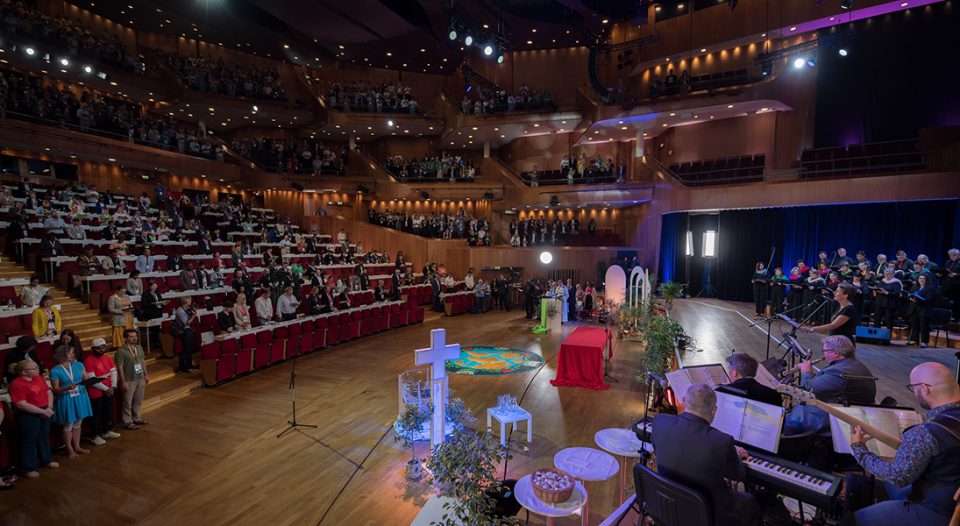The 13th Assembly of the Lutheran World Federation (LWF) concluded in Kraków, Poland, on Sept. 19 with member churches pledging to strengthen the bonds between them, celebrate the gift of unity in diversity and serve the neighbor, “knowing that the center is always Christ.”
In a published message, delegates to the weeklong gathering of the LWF’s highest decision-making body say they are returning to their home countries “with a deeper sense of what it means to be churches in communion.” As churches in ongoing reformation, they state, “we are called to work for peace in the world, between people, countries and with the whole creation.”
Citing the assembly theme, “One Body, One Spirit, One Hope,” the delegates say they will “heed the call to live and walk together as churches in an ecclesial and confessing communion, witnessing to our faith, in God’s holistic mission.”
They pledge to be more effective advocates for economic and climate justice in times when bodies are hurting, rejected and excluded and the earth is suffering from the effects of climate emergencies.
Theological grounding and the sustainability of the Lutheran communion’s churches emerged as key topics at the assembly.
Theological grounding and the sustainability of the Lutheran communion’s churches emerged as key topics at the assembly. In the message they underline the importance of stronger theological education and leadership formation that enables people to engage complex issues without resorting to simplistic answers. “Responsible theology,” they write, “builds inclusive communities” and “gives space for the renewing and reforming power of the One Spirit.”
The assembly schedule included a visit to the former concentration and extermination camps of Auschwitz-Birkenau. In the message, assembly delegates reaffirm the 1984 Assembly’s declaration that antisemitism is a contradiction and affront to the gospel. They express “continued commitment to live out our Lutheran heritage in the Christian faith with love and respect for the Jewish people.”
The assembly noted that Christian churches in some parts of the world continue to face persecution and limits to free speech for their stands on justice and human rights. The message deplores such discrimination irrespective of where it occurs and calls on the LWF to address this concern.
“Hope is the lens through which we look at the world, as followers of Christ,” the delegates declare. They affirm Lutherans’ participation in God’s holistic mission through proclamation, advocacy and diakonia both local and global. And they call on the communion of churches to find new ways of offering “bold hope that is inspired by our faith in God” and providing service to people in need, including migrants, refugees and those affected by crises.
A new president and council
The assembly elected Danish Bishop Henrik Stubkjær as the new president of the LWF. A theologian known for his diaconal and ecumenical work, Stubkjær was formerly head of the diocese of Viborg in the Evangelical Lutheran Church in Denmark.
“My vision for LWF is that we gain added value by working together as a communion striving to put Christian faith into action through humanitarian and development work, advocacy, shared witness and dialogue,” Stubkjær said at the assembly. Noting that “to be Lutheran is to be contextualized,” he said the diversity to be found within different contexts reveals how “God, through his Son Jesus Christ, is nurturing us as member churches … to preach the gospel in a relevant way.” Therefore, he added, “I will see it as my responsibility to secure diversity and that all voices will be heard.”
The assembly also elected the new LWF Council, an annual governing body comprising 48 representatives from the communion’s member churches around the world.
“God, through his Son Jesus Christ, is nurturing us as member churches … to preach the gospel in a relevant way.”
The new counselors represent churches from the seven LWF regions: Asia (10 representatives), Africa (10), Central Eastern Europe (five), Central Western Europe (eight), Latin America and the Caribbean (four), the Nordic countries (six) and North America (five).
Half the new council members are women and 13 are youth delegates, in compliance with the LWF’s policy of gender and generational inclusion that mandates 40% men, 40% women and 20% youth in governing bodies. ELCA representatives who were elected were William Flippin Jr., rostered minister; Khadijah Islam, member and Lutheran World Federation Global Young Reformer; Leila Ortiz, bishop of the Metropolitan Washington, D.C. Synod; and Brad Wendel, member and co-chair of the former ELCA Task Force on Women and Justice: One in Christ.
Stubkjær was installed, alongside members of the new council, during the assembly’s closing worship on Sept. 19. The first meeting of the new council under his leadership took place Sept. 20.
This story is adapted from articles that first appeared at lutheranworld.org.





